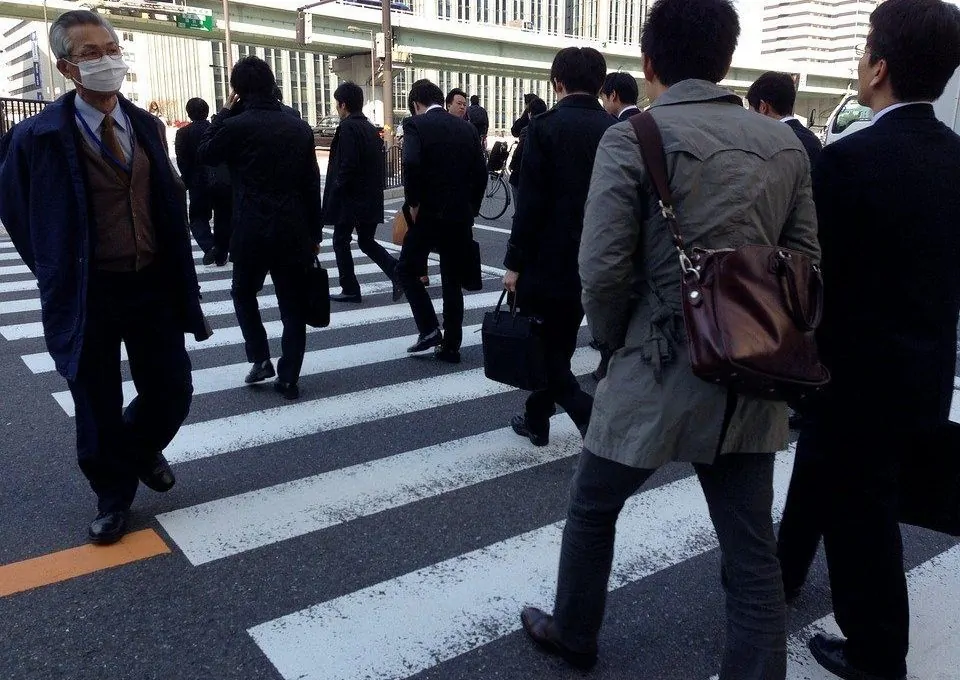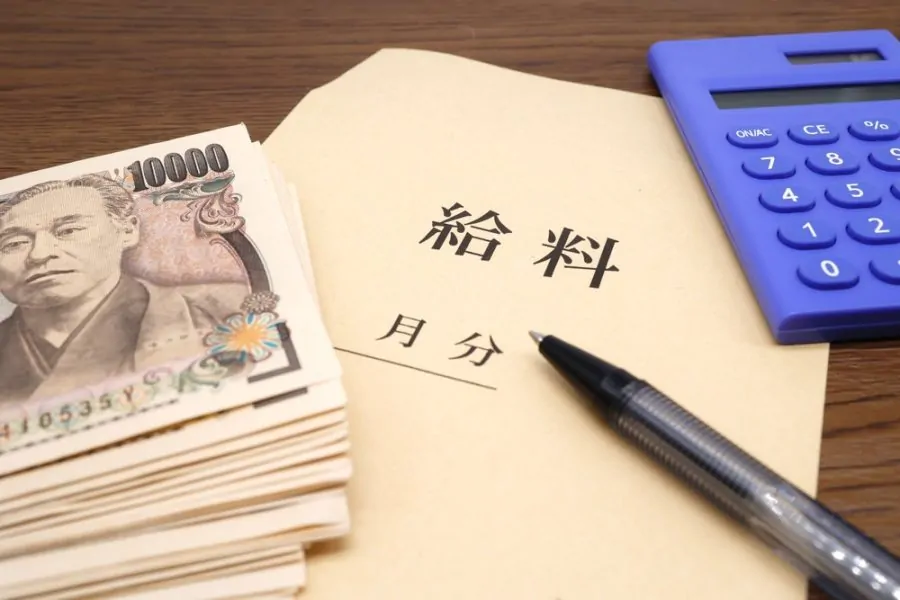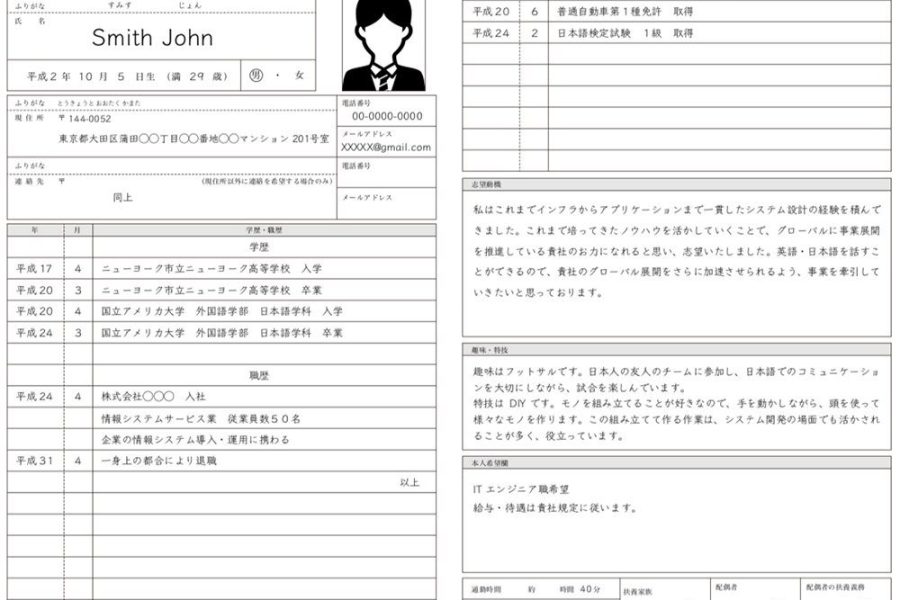Job hunting can be frustrating in your home country or abroad; Japan has its own set of unique rules, and to succeed, you need to be aware of these cultural differences.
Whether you are coming from your home country with zero experience working in a Japanese environment or are a long-time expat looking to expand your horizons, this guide can help you find your next job in Japan!
What are your career options in Japan?
Most foreigners who come to Japan start their careers as English teachers, especially Americans, through the well-known JET Program or a private English conversation company (Eikaiwa). Expats often spend from 1 to 5 years in that position while picking up and improving their Japanese language skills.
However, teaching English isn’t necessarily the only career path in Japan. There are job opportunities across all fields. Japan has a preference for skill over experience, as this makes it easier to train prospective employees.
Most importantly, your Japanese language proficiency will also have to be up to par to communicate effectively with your co-workers, so JLPT N2 is at least required to enter the Japanese workforce.
There are exceptions. However, IT and engineering are fields that often seek highly skilled individuals regardless of their Japanese proficiency, so you sometimes don’t need to speak Japanese to land a job in Japan.
Where to look for a job in Japan
Japanese Online Job boards
There are many ways to look for a job in Japan; the easiest way to find job postings is via the internet through job boards. The only danger to applying to potential jobs online is how generic your cover letter and resume will start to sound after the 5th application.
Like in any other job-hunting situation, it’s best to hone in on a few potential positions and dedicate time to research the company, and write out a cover letter specifically for that company.
Here is a selection of job-hunting websites to find a job in Japan:
| Job Board Website | Description |
|---|---|
| GaijinPot Jobs | GaijinPot is a site that mainly caters to English speakers with low level Japanese skills. Most of the postings are for English teaching jobs. Mostly in language schools. |
| Japan Dev | Japan-Dev is an English-friendly job board specialized in IT Jobs in Japan. |
| Daijob | Daijob is the hub for information technology and finance positions. There are many interesting career opportunities on Daijob ranging from investment banking to accounting. However, many positions require the relevant qualifications and a high level of Japanese. |
| JobsInJapan | JobsInJapan also has a high number of English teaching and IT jobs, but the site also provides other options too. |
| CareerCross | CareerCross has jobs in almost every field, many that offer visa sponsorship since the positions call for technical skills. Many positions require a high level of Japanese. |
| Indeed | Indeed is originally an American employment search engine, however many Japanese companies post openings. All postings are in Japanese so applicants will be expected to have a high level of Japanese (at least N2). Indeed is not often used by foreigners in Japan so competition won’t be as fierce. |
A common mistake many foreign applicants make is to talk about how that job will allow them to improve their Japanese ability/get to know Japanese culture/realize their dream of living in Japan, etc.
Make sure to specify how YOU can be BENEFICIAL to the company and not the other way around!
Networking in Japan
For those already living in Japan, this gives you a massive advantage over your competition. Business relationships in Japan often play a more significant role in the decision-making process than overseas, and building a solid and varied network can help find jobs in Japan.
Networking is an easy and enjoyable way to meet a broad group of people from different working fields in Japan. At these events, you can connect to companies and meet with recruiters, not to mention learn about positions before they are even offered online! Cast a wide net and get to know people; you never know when a contact will come in handy!
Join an international group on Facebook or MeetUp to learn more about specific industry events. You should also keep an eye out for the American Chamber of Commerce in Japan; they frequently hold networking events open to all nationalities.
When attending these events, taking some business cards with you is essential. The exchange of business cards (名刺交換) is deeply ingrained in Japanese business etiquette.
There are some rules to exchanging business cards, the foremost being:
- Give and receive cards using both hands.
- When giving your card, ensure that it is turned towards the receiver.
- Keep the received cards on display. Do not shove them into your pocket or wallet – this is considered rude. Use a card holder instead.
- Do not write or fold the received cards; treat them with respect.
Grab your business cards (you can have some easily made up here, VistaPrint) and head to the next networking event near you!
You can find out about the next networking event happening in your city at the following sites:
- Tokyo: EventBrite
- Nationwide: Meetup
Enlist a recruiter in Japan
If none of the above options have garnered results, there is also the option to enlist a Japanese recruiter to help in your job search. A recruiter’s sole purpose is to find suitable jobs that fit your requirements and qualifications and prepare you for the interview.
They are fast, efficient, and driven to get the desired results. If you get the job, they get a commission slice from the company that hires you. A win-win situation for everybody involved.
They’ll send job information to you directly and introduce you to potential companies, making it easier to get your foot in the door for an interview and help prepare you for the initial job interview. Plus, their services are 100% free.
You can contact Japan-based recruiters at the following websites:
Filling out a Japanese Resume
Regardless of your job search method, it will eventually lead to you filling out a Japanese resume (履歴書). You can pick up template copies of a standard resume in stationery and convenience stores or get one online. Traditionally these are filled out by hand with a black pen; however, recently, more and more companies have been more open to accepting typed-out resumes.
It’s an essential step in job searching and should not be taken lightly. From looking simply looking at a handwritten resume, employers can understand a lot about the potential candidate.
The fact that a candidate has taken the time to write out their educational background and work history, as well as their reasons for applying to the company, conveys their desire to work there.
Even if you can’t write kanji, employers will appreciate your effort with your resume.
It can be hard work filling out your resume over and over for potential jobs, but it will pay off! What is essential, though, is that there should be nothing crossed or scribbled out. Whiteout should not be used. Instead, you should simply start again.
Japanese Dress Standards: What to Wear for a Job Interview with a Japanese Company
It goes without saying that if you want that job, you must dress the part, and Japan is no different. However, there are some unspoken rules about what to wear to an interview in Japan.
Often these rules are implemented by the hiring board, and though the scene is changing with younger and more open-minded companies, it’s still highly recommended to follow the Japanese dress standards. You only get one chance to make a first impression!
Here is our advice on dressing for a job interview at a Japanese company and maximizing your chances:
| Advice | Men | Women |
|---|---|---|
| Hairstyle / Beard | Hair must be clean and in its natural color (it should not be dyed). Should be short enough for the ears to show be neatly combed. Men should be clean-shaven. If sporting a beard or a moustache, it should be trimmed neatly. | Hair must be clean and in its natural color (it should not be dyed). Hair should be combed or neatly tied up. |
| Clothing | You should wear a typical dark suit appropriate for a job interview, nothing patterned or with pinstripes. A single suit with two buttons is better than a double suit. The top button must be fastened. The shirt must be white. | A typical dark-colored suit either black, navy or grey is appropriate. A simple white blouse. Pant suits are acceptable. Skirts are acceptable too, but it should not be too short. Knee length is perfect. Sheer tights should be worn and must not have a run. |
| Shoes | Shoes must be simple and the color should be black or brown. They must be polished well. | They must be a simple pair of pumps. T heir color should match the color of the suit. The heels shouldn’t be too high. About 5cm-7cm is fine. They must be polished well. |
| Make Up & Accessories | Do not wear strong perfume or cologne. If you have facial piercings it’s better not to wear them. | Make-up should be simple and not flashy. Eyeshadows should be a neutral colour. It’s better not to use perfume. Simple stud earrings are fine but facial piercings should be removed before the interview. Necklace must be simple and not flashy. |
| Nails | Nails should be trimmed short and not colored. | The same applies to women. Clear or a neutral-colored nail polish is acceptable. |
Of course, interviewers will get bored of seeing the same attire over and over. Many young Japanese have complained that these strict standards restrict personality. Some have even shown up to interviews in casual clothing and ended up landing the position! It’s entirely up to you how you want to make a splash in your interview.
Online interviews when applying from Overseas to a company in Japan
If you are applying from abroad or have been offered an interview via Skype, FaceTime, or other similar apps, don’t be fooled into thinking that you’re not doing an actual interview. Act, dress, and speak as professionally as you would in a face-to-face interview.
It’s surprising how in these types of interviews, people will often sit back, relax and take a big swig of water or, worse, a can of fizzy drink. No company wants to hire someone that comes off as sloppy or lazy.
The Japanese job Interview
Getting ready for a job interview can be a nerve-wracking experience, but being prepared is vital. Whether you are Japanese or not, there are specific business etiquette rules you should try to follow during your interview.
There is even a set way to enter the interview room, as shown below:
- Knock on the interview room door and say 失礼します (Excuse me.)
- You may enter when you hear the interviewer say どうぞ (Please, come in).
- When entering the room, face the interviewer/panel and repeat 失礼します, then bow.
- Stand next to your chair and say ___と申します。どうぞよろしくお願いします (My name is ___, it is a pleasure to meet you.)
- Bow once more. The interviewer will invite you to take a seat by saying どうぞ、座ってください (Please sit down.)
- You may sit down once hearing this.
Try to maintain an upright posture and not lean back when sitting down. Legs should be closed, and hands placed flat on your legs. Throughout the interview, your body will want to relax, but this posture is inappropriate for a Japanese interview.
It is best to maintain this posture out of respect for the interviewer and the company you are applying to. You will then be asked several questions for 30 minutes to an hour.
Have confidence and try to deliver detailed answers.
Common Job Interview Questions at Japanese Companies
While it’s impossible to predict precisely what you’ll be asked in your interview, many companies will ask at least one of the following common interview questions:
Please introduce yourself. 自己紹介をお願いします。
Japanese companies like to hear that their employees are enthusiastic about Japan. Try to give a few key points about what drew you to working here. Prepare a short monologue, including your educational background, work history, and why you came to Japan.
Why do you want to work for this company? どうしてうちの会社かいしゃで働はたらきたいと思おもったのですか?。
The interviewer is seeing if you have done your research on the company. Your answer should convey that you have done your research and show how the things you mention about the company align with your own personal values too.
Tell me about your previous position. 前職の仕事内容を教えてください。
When explaining your previous situation, make sure to connect to the job you are interviewing for. Mention any common technical and soft skills and highlight projects where you took the lead or inspired a positive change in the company.
Why did you leave your last position? 今いまの仕事しごとを変かえたい理由りゆうはなんですか。
The interviewer will be watching closely how you answer this question. Phrase your reason positively by focusing on things you want to achieve. Never criticize a previous employer or company; this will only reflect poorly on yourself.
How long do you plan to stay in Japan? いつまで日本に住むつもりですか。
The interviewer is trying to see whether you are a potential employee worth investing in. You should answer honestly, but be aware that few companies will want to invest time and energy training an employee that will only stick around for a few years. In Japan, it’s common for people to stay with a company for at least ten years, if not throughout their whole lives.
Why is there a gap in your employment? なぜあなたの雇用にギャップがありますか。
Employment gaps are sometimes regarded negatively, especially so in Japan. However, a common reason for having a gap between jobs is taking time off to get qualifications related to their industry. Qualifications will make your resume stand out in a sea of applications!
Tell me about your hobbies and interests. 趣味はなんですか。
Your personality is an essential factor in getting hired but consider your environment. You don’t want your interview hearing too much. Talking about team sports is a safe option as it shows that you’re a team player, or your travel blog shows that you are creative. Your hobbies will be distinct and different from your work, but you can emphasize the hobby that requires the critical technical and soft skills employers are looking for.
Where do you see yourself in 5 years? 5年後どのような仕事したいですか。
This is a chance to show another side of yourself and build rapport with the interviewer. You want to come across as ambitious but be careful not to seem as though the current company you are applying for is a stepping stone in your career plans. Think carefully about your answer and how this position fits your future career plans.
Do you have any questions for me? 何か質問がありますか。
This question will be asked at the end of the interview. You should always have several questions prepared in advance. Try to ask questions that can’t be answered simply by looking at the company website (you should know about the company inside out before the interview). Instead, you ask insightful questions that underline your interest in the position and the company.
At the end of the interview, remember to stay polite and professional. There may be more small talk towards the end – this is still part of the interview! If you want to leave a lasting positive impression, shake hands firmly, maintain eye contact and leave the interview room confidently. Also, don’t forget to follow up with a brief email thanking the interviewer for their time.
Finally, it’s simply a waiting game from then on to see if you got the job!
Common Questions About Job-Hunting in Japan
I don’t live in Japan. Is it better to apply from overseas first or go to Japan first?
Moving to Japan without a job lined up can be daunting, especially if you don’t speak the language. For job seekers still learning Japanese, it’s best to apply from overseas and receive visa sponsorship from your employer. This will ensure you have all the proper paperwork for the work visa, and you’ll arrive at a support network.
Though it’s possible to come to Japan on a tourist visa and change it to a working one after finding employment, this requires a lot of paperwork. On top of this, you’ll also have to deal with finding an apartment and setting up a Japanese bank account, which is challenging to do without a job offer.
If you have highly proficient Japanese and have technical skills and experience, you’ll have more luck than most find employment in Japan. However, getting your foot in the door can be tricky without a network.
Though not necessarily planned, many foreigners apply for the JET Program, which the Japanese government runs, and teach English for several years in an international school. While working as teachers, they build up their skills and network and often find employment through connections.
I’m an English teacher in Japan, but I don’t have any other skills!
Though having a well-developed skill set, many companies in Japan prefer to train their employees in the skills they lack in. From their perspective, they can create their ideal employee! Since you’re in Japan, you can also network! Use your free time to study, pick up and develop a new skill set.
Networking will get you in the door much faster than applying for a position online. Japan relies on personal connections and prefers to build its workforce through networking.





Leave a Comment